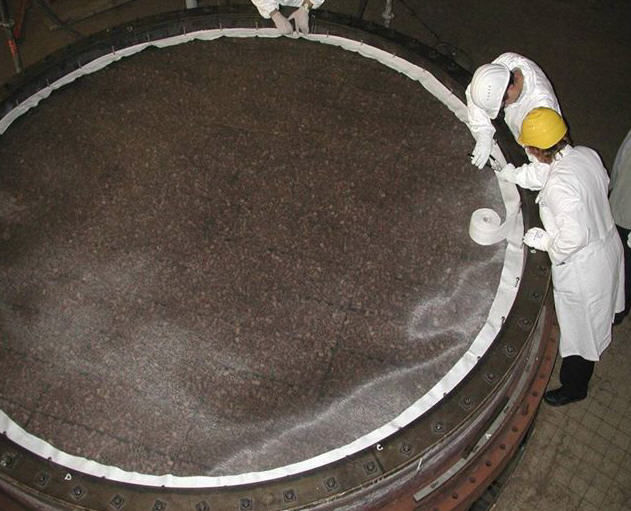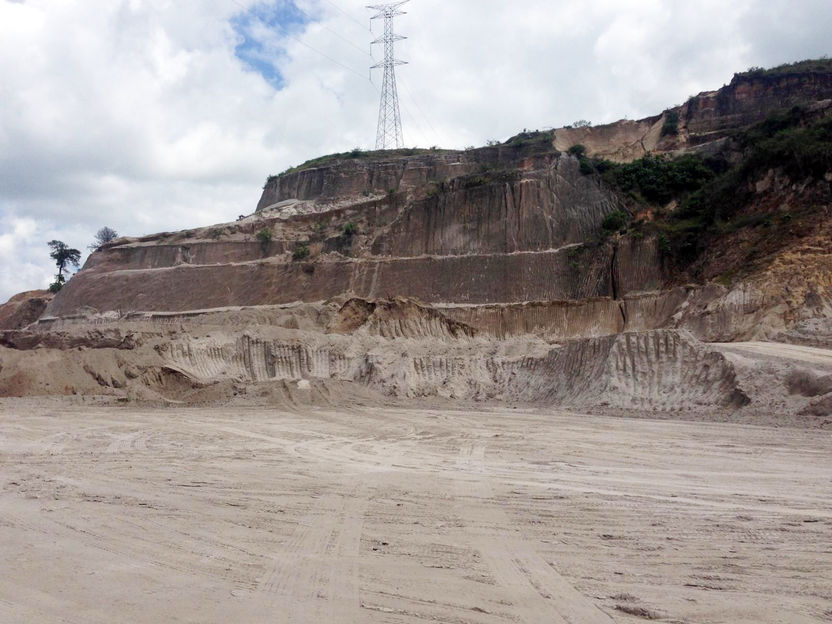South African producer of nitric acid contributes to climate protection with Heraeus innovation
Conventional platinum gauze catalyst was further optimized
Since early this year, the firm SASOL Nitro in South Africa has been using a newly developed multistage catalyst from the precious metals and technology group Heraeus for the selective destruction of nitrous oxide, a greenhouse gas, in two of its nitric acid production plants. With this catalyst technology, Sasol is making a contribution to climate protection. In July, it was listed as the first company in the world to participate in the Clean Development Program using secondary catalysts under the auspices of the Kyoto Protocol. The goal of the Kyoto Protocol is the global reduction of the gases responsible for climate change.

A multistage catalyst from Heraeus is installed in an fertilizer plant.
Heraeus Holding GmbH
Large quantities of catalysts made of platinum alloys in the form of knitted gauzes of up to six meters in diameter are used in the manufacture of nitric acid in the chemical industry. However, the oxidation of ammonia also produces nitrous oxide (N2O) in a secondary reaction. Nitrous oxide is a greenhouse gas that is 310 times more harmful than carbon dioxide. In 2005, Heraeus developed a novel multistage catalyst that can reduce the production of nitrous oxide by up to 90% when ammonia is oxidized. The crucial feature of the innovation is a downstream secondary catalyst that specifically destroys the nitrous oxide produced. "Our consistent focus on innovation has enabled us to improve not only the efficiency of the time-tested platinum gauze catalyst but also to reinvent it with regard to environmental compatibility," points out Dr. Roland Gerner, Managing Director of the business segment W. C. Heraeus GmbH. "Besides the positive impact on greenhouse gas emissions, we are also substantially strengthening our competitiveness."
The long-term customer Sasol Nitro is one of the first companies to upgrade its nitric acid plants with the secondary catalyst from Heraeus. Not only does the environment benefit from the reduction of nitrous oxide but also the producer of nitric acid. Under the Kyoto Protocol, it can generate CO2 certificates in developing and emerging countries and profit from their sale. If the producer reduces one ton of nitrous oxide, it is credited with 310 CO2 certificates (based on the global warming potential compared with carbon dioxide). By selling these certificates to other companies, Sasol also profits financially from the upgrade.
Other news from the department manufacturing

Get the chemical industry in your inbox
By submitting this form you agree that LUMITOS AG will send you the newsletter(s) selected above by email. Your data will not be passed on to third parties. Your data will be stored and processed in accordance with our data protection regulations. LUMITOS may contact you by email for the purpose of advertising or market and opinion surveys. You can revoke your consent at any time without giving reasons to LUMITOS AG, Ernst-Augustin-Str. 2, 12489 Berlin, Germany or by e-mail at revoke@lumitos.com with effect for the future. In addition, each email contains a link to unsubscribe from the corresponding newsletter.
Most read news
More news from our other portals
Last viewed contents
DyStar L.P. Acquires Anglostar LLC and Subsidiaries
Electrochemical extraction of silicon: new approach for a more environmentally friendly large-scale process? - Environmentally Friendly Silicon Production





























































